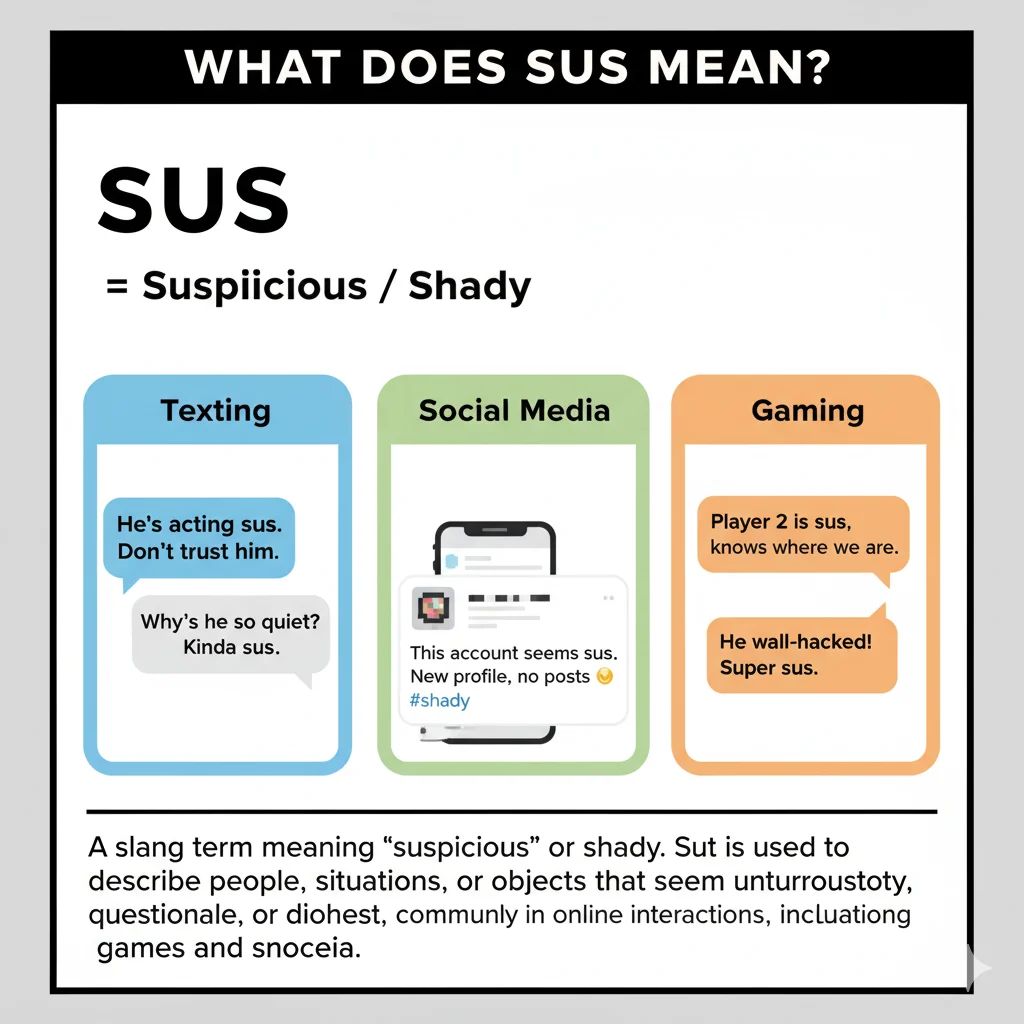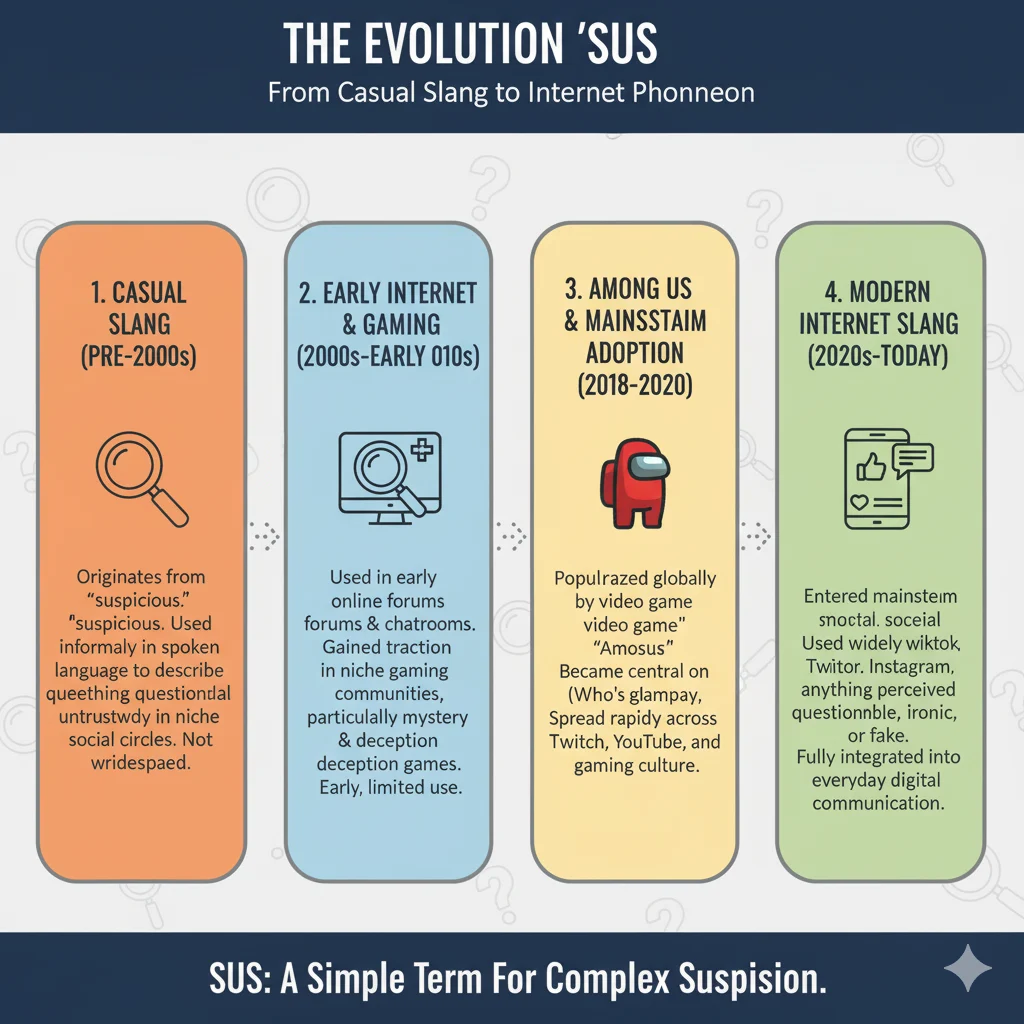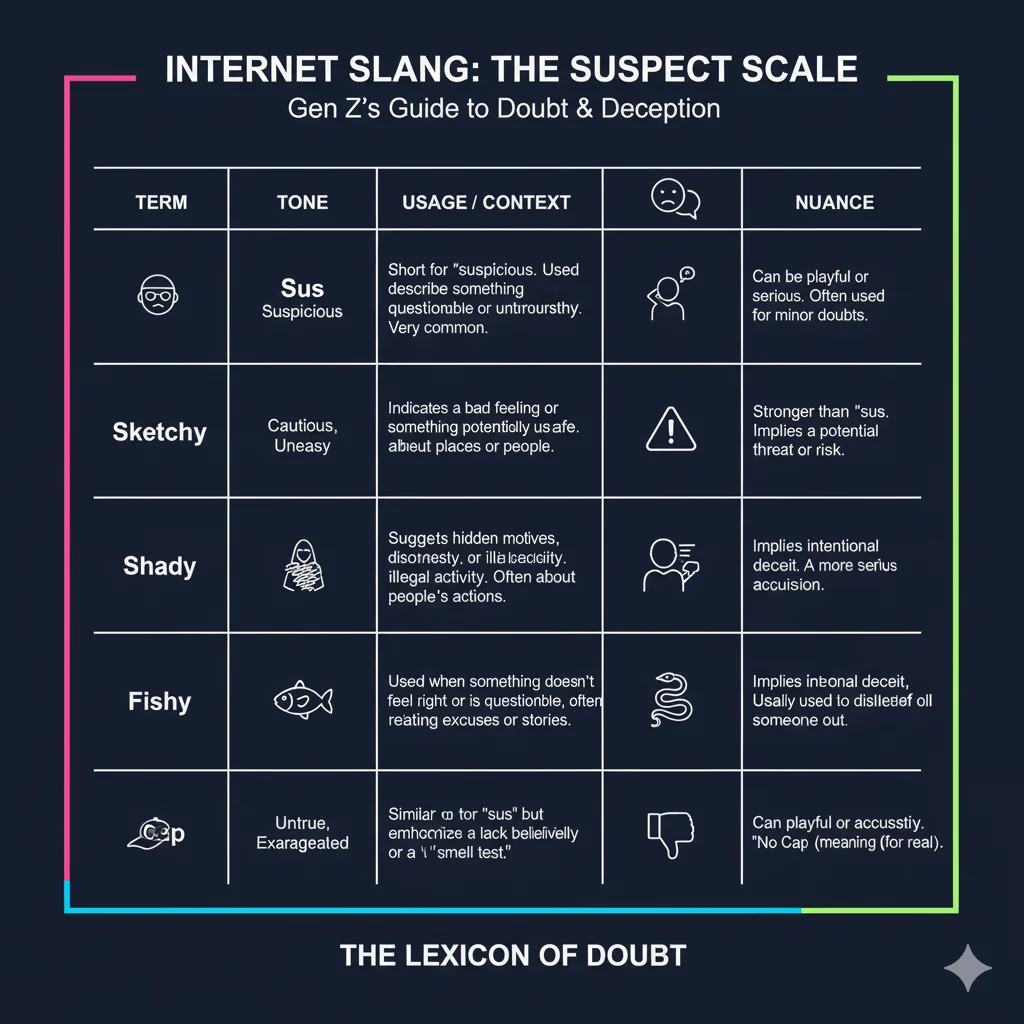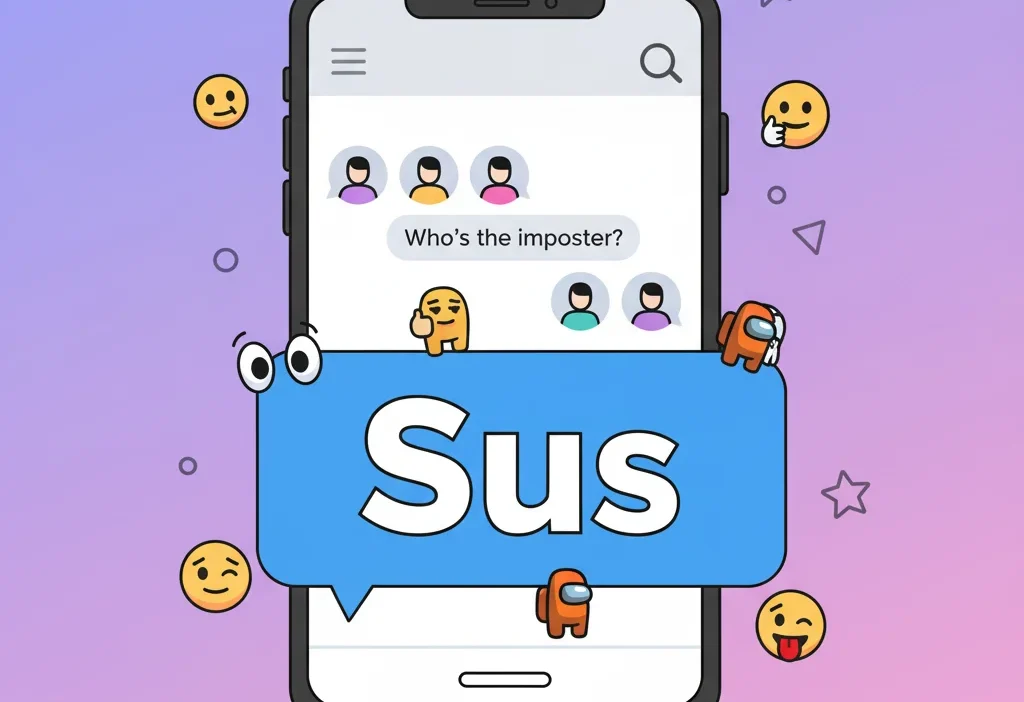“Sus” in texting, social media, and gaming stands for “suspicious” or “suspect,” used to describe someone or something that seems shady, untrustworthy, or questionable. It is extremely popular among Gen Z, especially on platforms like Discord, TikTok, Instagram, and in gaming communities like Among Us.
📝 Understanding “Sus”
“Sus” is shorthand for “suspicious”, and it has evolved from casual slang into mainstream online usage. The term is mostly used in a playful, humorous, or casual context rather than serious accusations.
Examples in Texting
- Friend: “I ate the last slice of pizza 🍕”
- You: “Bro, that’s sus 😏”
- Social media: “He said he’s working, but I saw him at the mall. Sus 👀”
- Gaming: “Red is acting sus, watch out!” (Among Us reference)
“Sus” can also be combined with emojis like 👀, 😏, or 🫣 to emphasize suspicion or jokingly call someone out.

🕰️ Origin and History of “Sus”
Early Usage
The abbreviation “sus” comes from the word suspicious and was initially used in casual text and online conversations.
Rise in Gaming Culture
- Popularized by Among Us (2018): Players call others “sus” if they suspect them of being the imposter.
- Quickly spread to Discord, Twitch, TikTok, and memes.
Why “Sus” Became Popular
- Short, easy to type
- Funny and playful, especially in gaming contexts
- Fits naturally into memes, captions, and casual conversations
“Sus” has transcended its original meaning, now serving both humorous and serious contexts online.

🔄 Sus vs Other Similar Slang
| Slang | Meaning | Tone | Usage |
|---|---|---|---|
| Sus | Suspicious / shady | Playful, joking, casual | Texts, social media, gaming |
| Sketchy | Untrustworthy | Informal, slightly serious | Casual chats, warnings |
| Shady | Dishonest or sneaky | Neutral to humorous | Social media, texting |
| Fishy | Suspicious | Informal | Conversations, humorous commentary |
| Cap | Lie / exaggeration | Playful | Contrasted with “no cap” |
Key Point: “Sus” is often used jokingly, especially among younger audiences, making it lighter than words like “shady” or “sketchy.”

📱 How “Sus” Is Used in Texting
Casual Friend Chat
- Friend: “I didn’t touch your laptop!”
- You: “That’s sus 😏”
Social Media Captions
- “He said he’s busy but I saw him at the party. Sus 👀”
- Adds humor and relatability to posts
Tone Modifiers
- Sus → Neutral, playful suspicion
- Sus! → Stronger emphasis, often humorous
- Sus 😏 → Playful teasing or joking
- Very sus 👀 → Dramatic or exaggerated suspicion
Texting with “sus” is fun and quick, allowing users to convey skepticism without long explanations.

🌐 Sus in Online Communities
Platforms
- TikTok: Short clips or captions calling someone or something “sus.”
- Discord: Text or voice chats, especially among gaming communities.
- Instagram: Stories, comments, or memes using “sus.”
- Twitch & YouTube: Streamers use “sus” for humorous commentary.
Example in Context
- Gaming: “Red vented in the cafeteria… sus!” (Among Us reference)
- Social Media: “That deal seems sus, I wouldn’t click it 👀”
In online communities, “sus” quickly conveys humor, suspicion, and relatability.
🎮 Sus in Gaming Culture
Among Us and Beyond
- “Sus” became viral due to Among Us, where players accuse each other of being the imposter.
- Phrases like “Red is sus” or “You’re acting sus” are widely recognized in gaming culture.
Other Gaming Uses
- Fortnite, Roblox, and other multiplayer games also adopted “sus” to describe shady or unexpected player behavior.
- Example: “He’s camping the loot drop… sus 😏”
Gaming culture amplified “sus” as a fun, relatable way to call out suspicious behavior.
🔗 Related Slang and Phrases
Common Alternatives
- Sketchy: Informal word for untrustworthy behavior.
- Shady: Someone acting dishonest or sneaky.
- Fishy: Something seems off or suspicious.
- Cap: Opposite of “no cap,” meaning a lie or exaggeration.
Tone Considerations
- “Sus” is casual and playful.
- Tone can range from humorous teasing to lighthearted warnings.
Understanding related slang ensures accurate usage in different social contexts.
⚠️ Common Misunderstandings About “Sus”
Misconception 1: “Sus” is serious
- Often playful or joking, especially among friends or gamers.
Misconception 2: Only for gaming
- Although popularized by Among Us, “sus” is now used widely in texting, memes, and social media.
Misconception 3: Everyone understands it
- Mostly recognized by younger generations and social media users; context matters for older audiences.
❓ FAQs About “Sus”
1. Can “sus” be used professionally?
- No, it is casual slang suitable for texting, social media, and gaming.
2. Is “sus” only for people?
- No, it can describe actions, situations, objects, or deals that seem suspicious.
3. How do emojis affect meaning?
- 👀 = emphasizing suspicion
- 😏 = playful or teasing tone
- 🫣 = shocked or exaggerated “sus”
4. Can “sus” be verbal?
- Yes, commonly spoken among Gen Z or in gaming communities.
5. Is “sus” permanent slang?
- Likely to evolve, but currently remains widely used in online conversations and memes.
🔚 Conclusion
“Sus” is a casual slang term meaning suspicious or shady. Its playful, humorous, and relatable usage makes it a staple of modern texting, social media, and gaming culture.
Key Takeaways:
- Sus = suspicious / shady / questionable
- Casual, humorous, and Gen Z-friendly
- Tone ranges from playful teasing to lighthearted suspicion
- Common in texting, memes, TikTok, Instagram, Discord, and gaming
Using “sus” correctly ensures fun, engaging, and relatable communication in digital spaces.





